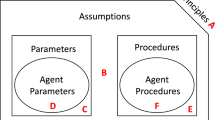Abstract
Laboratory experiments are among the most frequently used methods in management accounting research because they offer high internal validity, enabling the examination of causal relationships. However, experiments often struggle with providing support for a specific proposed causal mechanism, given the abundance of psychological and behavioral theories that predict similar outcomes. In this paper, we argue that agent-based modeling is well suited to complement experiments because agent-based modeling is a powerful method to increase confidence in the proposed causal mechanism. As a showcase project, we conduct an experiment to explain antecedents of honest reporting behavior in a participative budgeting setting and propose that a social norm of honesty is the underlying causal mechanism. Next, we adapt an agent-based model to our participative budgeting setting and create two submodels incorporating alternative causal mechanisms. Finally, we assess the capability of the two submodels to reproduce the experiment’s results to evaluate whether the observed behavior in the experiment can be better explained with the causal mechanism representing social norm theory.
Access this chapter
Tax calculation will be finalised at checkout
Purchases are for personal use only
Similar content being viewed by others
References
Bloomfield, R., Nelson, M.W., Soltes, E.: Gathering data for archival, field, survey, and experimental accounting research. J. Account. Res. 54(2), 341–395 (2016)
Guffey, D.M., Harp, N.L.: The journal of management accounting research: a content and citation analysis of the first 25 years. J. Manag. Account. Res. 29(3), 93–110 (2016)
Abernethy, M.A., Chua, W., Luckett, P.F., Selto, F.H.: Research in managerial accounting: learning from others’ experiences. Account. Finan. 39(1), 1–27 (1999)
Janssen, M.A., Ostrom, E.: Empirically based, agent-based models. Ecol. Soc. 11(2) (2006)
Levitt, S.D., List, J.A.: Homo economicus evolves. Science 319(5865), 909–910 (2008)
Asay, H.S., Guggenmos, R., Kadous, K., Koonce, L., Libby, R.: Theory testing and process evidence in accounting experiments. Account. Rev., (2021)
Smith, E.B., Rand, W.: Simulating macro-level effects from micro-level observations. Manage. Sci. 64(11), 5405–5421 (2018)
Fehr, E., Schmidt, K.M.: A theory of fairness, competition, and cooperation. Q. J. Econ. 114(3), 817–868 (1999)
Bicchieri, C.: The Grammar of Society: The Nature and Dynamics of Social Norms. Cambridge University Press, New York (2006)
Andrighetto, G., Brandts, J., Conte, R., Sabater-Mir, J., Solaz, H., Villatoro, D.: Punish and voice: punishment enhances cooperation when combined with norm-signalling. Plos One, 8(6) (2013)
Klingert, F.M.A., Meyer, M.: Effectively combining experimental economics and multi-agent simulation: suggestions for a procedural integration with an example from prediction markets research. Comput. Math. Organ. Theory 18(1), 63–90 (2012)
Lorscheid, I., Meyer, M.: Toward a better understanding of team decision processes: combining laboratory experiments with agent-based modeling. J. Bus. Econ. 91, 1–37 (2021)
Lorscheid, I., Meyer, M.: Agent-based mechanism design—investigating bounded rationality concepts in a budgeting context. Team Perform. Manage. Int. J. 23(1/2), 13–27 (2017)
Wall, F., Leitner, S.: Agent-based computational economics in management accounting research: opportunities and difficulties. J. Manag. Account. Res. 33(3), 189–212 (2021)
Brown, J.L., Evans, J.H., III., Moser, D.V.: Agency theory and participative budgeting experiments. J. Manag. Account. Res. 21(1), 317–345 (2009)
Douthit, J.D., Stevens, D.E.: The Robustness of honesty effects on budget proposals when the superior has rejection authority. Account. Rev. 90(2), 467–493 (2015)
Blay, A., Douthit, J., Fulmer, B.: Why don’t people lie? Negative affect intensity and preferences for honesty in budgetary reporting. Manag. Account. Res. 42, 56–65 (2019)
Abdel-Rahim, H.Y., Stevens, D.E.: Information system precision and honesty in managerial reporting: a re-examination of information asymmetry effects. Account. Organ. Soc. 64, 31–43 (2018)
Bicchieri, C.: Norms in the Wild: How to Diagnose, Measure, and Change Social Norms. Oxford University Press, New York, NY (2017)
Boster, C., Majerczyk, M., Tian, Y.: The effect of individual and pooled profit-sharing plans on honesty in managerial reporting. Contemp. Account. Res. 35(2), 696–715 (2018)
Masclet, D., Noussair, C., Tucker, S., Villeval, M.-C.: Monetary and nonmonetary punishment in the voluntary contributions mechanism. Am. Econ. Rev. 93(1), 366–380 (2003)
Noussair, C., Tucker, S.: Combining monetary and social sanctions to promote cooperation. Econ. Inq. 43(3), 649–660 (2005)
Fehr, E., Gächter, S.: Cooperation and punishment in public goods experiments. Am. Econ. Rev. 90(4), 980–994 (2000)
Evans, J.H., Hannan, R.L., Krishnan, R., Moser, D.V.: Honesty in managerial reporting. Account. Rev. 76(4), 537–559 (2001)
Fehr, E., Fischbacher, U.: Third-party punishment and social norms. Evol. Hum. Behav. 25(2), 63–87 (2004)
Dimant, E., Bicchieri, C., Xiao, E.: Deviant or wrong? The effects of norm information on the efficacy of punishment. SSRN (2018)
Cialdini, R.B., Reno, R.R., Kallgren, C.A.: A focus theory of normative conduct: recycling the concept of norms to reduce littering in public places. J. Pers. Soc. Psychol. 58(6), 1015–1026 (1990)
Baiman, S.: Agency research in managerial accounting: a second look. Acc. Organ. Soc. 15(4), 341–371 (1990)
Sutton, R.S., Barto, A.G.: Reinforcement learning. J. Cogn. Neurosci. 11(1), 126–134 (1999)
Author information
Authors and Affiliations
Corresponding author
Editor information
Editors and Affiliations
Rights and permissions
Copyright information
© 2023 The Author(s), under exclusive license to Springer Nature Switzerland AG
About this paper
Cite this paper
Plähn, J., Bellora-Bienengräber, L., Mertens, K.G., Meyer, M. (2023). Combining Experiments with Agent-Based Modeling: Benefits for Experimental Management Accounting Research. In: Squazzoni, F. (eds) Advances in Social Simulation. ESSA 2022. Springer Proceedings in Complexity. Springer, Cham. https://doi.org/10.1007/978-3-031-34920-1_30
Download citation
DOI: https://doi.org/10.1007/978-3-031-34920-1_30
Published:
Publisher Name: Springer, Cham
Print ISBN: 978-3-031-34919-5
Online ISBN: 978-3-031-34920-1
eBook Packages: Physics and AstronomyPhysics and Astronomy (R0)




